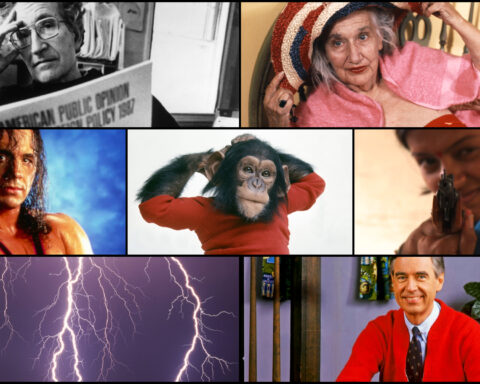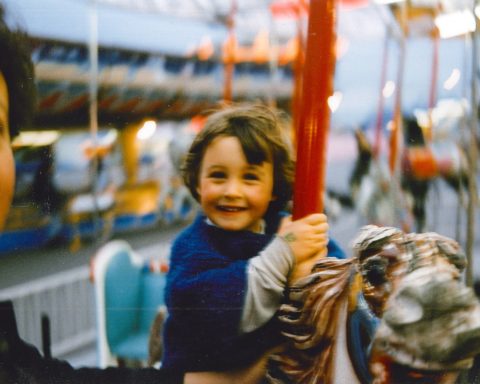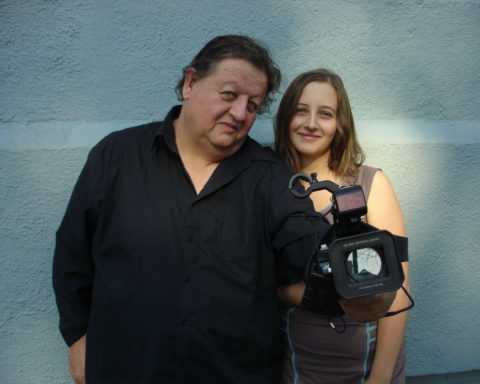‘STOP ALL THE CLOCKS,’ wrote W. H. Auden in 1938. On Monday, November 18, 2013, it felt like all the clocks had stopped. Peter Wintonick had died.
Where did 36 years of friendship go? I reached back for a time before the age of documentary film festivals, before consent was manufactured, when documentary cinema was verite. Many fragments of memory drifted back that could be woven into a tapestry of Peter. And I found a sketch I made over 30 years ago, which I now cherish. (_see above photo_)
Fragments came back to me—like our baseball team, the Mediatrics, geriatric media workers. Peter was 27. We played in the McGill post-graduate league. Alongside Peter were Tiff (Ian Ferguson), my brothers Paul and Ricky, Sean, John, Roger, Nicky, the Reid brothers and Wenk. Tiff and Ricky are also no longer with us. Perhaps they’ll find a ballgame with Peter wherever they are. As Paul said, “Peter could hit a ton.” He sure could and he seemed to float around the bases, like an angel in a T-shirt, on our magical McTavish Reservoir field.
That day the clocks stopped also felt like a Happening. What Peter called the Art of Life or the Life of Art was as vibrant as ever at the time of his death. A Happening indeed. What drifted back to me were the Happenings we staged with Peter 30 years ago, galvanized by Marie Serdynska (who would become Mira’s godmother), the artists Jane and Joan Churchill, and other occasional members of our loose company. We dressed up, Peter especially, probably channeling Fellini. (Was there a top hat? There should have been.)
Some Happenings happened at Jane Churchill’s heavenly place in the country. My brother Paul remembers a hospital scene in one of them…with blood. Everyone always died at the end. Those highly charged days came back to me so poignantly because they made me think that in a sense, Peter’s life was a sort of Happening. Art and life, work, ideas, performance, the people he loved were always there in a brilliant constellation.
If Peter’s life was a Happening, it is how he made things happen for others that is his mighty legacy.
His special philosophy was already forming back then. I found an old photocopy among my stuff of something Peter had written for the magazine _Cinema Canada_ in 1983. It took the form of a series of postcards to Ron Mann. It is still as fresh and inspirational as it was then. This is a short fragment. It comes from a postcard called Reflections. “But now it’s time for our visions to be considered. Us. Those who want to create. To work. To make films of value and meaning. I understood that here, on the verge of 30, inbred qualities of illusory idealism and ’60s-inspired positivism and respect for the collective possibilities of filmmaking pale and wither away in the face of the oligarchical, patriarchal realities of the FILM BUSINESS. I had always thought it would be possible for individuals and groups of individuals to move beyond that stage. I know it is possible because I’ve seen it done. In my mind are 25 examples. That’s the number of video interviews I did with independent, international film directors for the New Cinema project.”
The directors included in Peter’s first documentary feature were Wim Wenders in his red glasses period, Chantal Akerman, Les Blank, Paul Morrissey, Emile de Antonio, Jean-Marie Straub and a grouchy Robert Frank, who let a screen door slam in Peter’s face. Of course, Peter thought that was a very good thing and the perfect end to the interview. Most of the interviews were shot at Avantage Productions, the company that Ian Ferguson and I had at the time, on the corner of Sherbrooke Street and Guy in Montreal. Peter was there as an editor, director, collaborator and guru.
“They all stand as testimonies to the possible,” Peter wrote. “They all struggle and in the end they all do it. WE can do it. Find the money somewhere—foundations, corporate guilt money, money from advocacy groups, government money (yes, even the CFDC, NFB and CBC can be simpatico when you march into their offices). Become known. Meet people. Hang around. Understand what you want and then take it. Be polite when you do. If they refuse, ask again. They’ll eventually give it to you. Learn to beg. Learn to think on your feet. Learn to change tactics. Learn to trust. Be honest. Confront. Make your own reality.” Thank you, Peter, with very much love.











